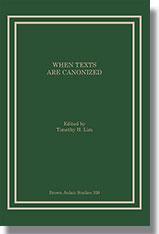How did canonization take place, and what difference does it make?
 Essays in this collection probe the canonical process: Why were certain books, but not others, included in the canon? What criteria were used to select the books of the canon? Was canonization a divine fiat or human act? What was the nature of the authority of the laws and narratives of the Torah? How did prophecy come to be included in the canon? Others reflect on the consequences of canonization: What are the effects in elevating certain writings to the status of “Holy Scriptures”? What happens when a text is included in an official list? What theological and hermeneutical questions are at stake in the fact of the canon? Should the canon be unsealed or reopened to include other writings?
Essays in this collection probe the canonical process: Why were certain books, but not others, included in the canon? What criteria were used to select the books of the canon? Was canonization a divine fiat or human act? What was the nature of the authority of the laws and narratives of the Torah? How did prophecy come to be included in the canon? Others reflect on the consequences of canonization: What are the effects in elevating certain writings to the status of “Holy Scriptures”? What happens when a text is included in an official list? What theological and hermeneutical questions are at stake in the fact of the canon? Should the canon be unsealed or reopened to include other writings?
Features
- Essays that contribute to our understanding of the complex processes of canonization
- Exploration of early concepts of canonicity
- Discussion of reopening the New Testament canon
Table of Contents
- An Indicative Definition of the Canon, Timothy H. Lim
- The Way of God: Early Canonicity and the “Nondeviation Formula”, Manfred Oeming
- Uses of Torah in the Second Temple Period, John J. Collins
- Bad Prophecies: Canon and the Case of the Book of Daniel, Michael L. Satlow
- Canon and Content, John Barton
- Jesus and the Beginnings of the Christian Canon, Craig A. Evans
- Canon and Religious Truth: An Appraisal of A New New Testament, R. W. L. Moberly
Timothy H. Lim is Professor of Hebrew Bible and Second Temple Judaism at the University of Edinburgh. He is a leading scholar of the Dead Sea Scrolls and canon research and the author of The Formation of the Jewish Canon (2013).